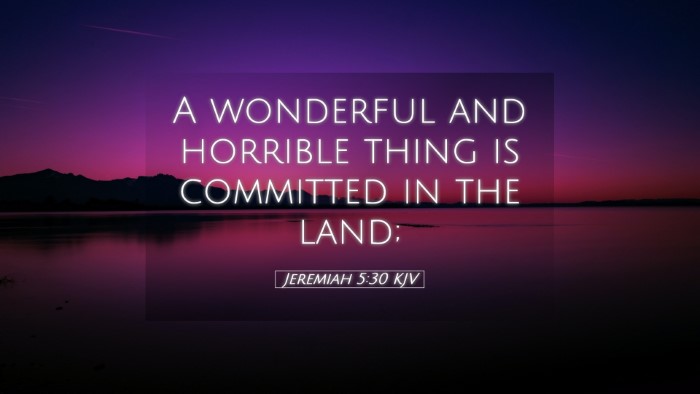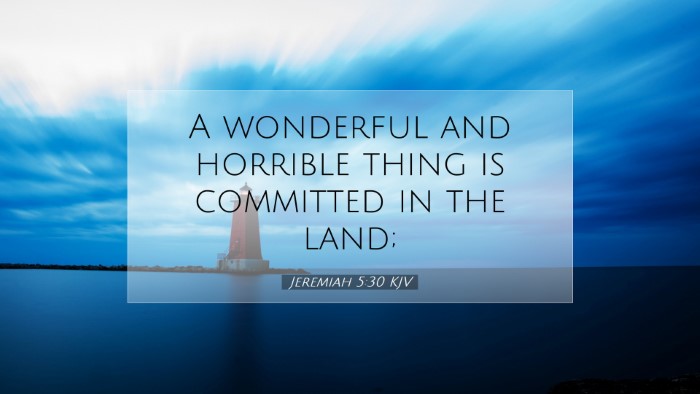Commentary on Jeremiah 5:30
Verse Context: Jeremiah 5:30 states, "A wonderful and horrible thing is committed in the land." This verse serves as a poignant reflection on the moral and spiritual decay within Judah during the time of the prophet Jeremiah. The phrase indicates deeply troubling conditions, suggesting both wonder (awe) at the extremities of human behavior and horror at the resultant consequences.
Analysis of the Verse
This verse encapsulates the critical themes of divine judgment and human rebellion against God. The profound nature of the statement reflects a conjunction of both divine wonder and human horror regarding the state of society.
Insights from Public Domain Commentaries
-
Matthew Henry:
Henry highlights that the verse captures the "sorrowful condition" of Israel, specifically regarding their departure from God’s commandments. He notes that such actions lead to a loss of spiritual discernment, where people can no longer distinguish between good and evil. Henry emphasizes that the "wonderful" aspect pertains to the greatness of God’s works, which is juxtaposed with the "horrible," representing the idolatry and moral failure prevalent in the nation.
-
Albert Barnes:
Barnes elaborates on the "wonderful and horrible” duality, stressing that the nation has fallen into a state where divine truths are ignored. He points out that the corruption is not merely social or political but deeply spiritual, showcasing a blatant disregard for the covenant relationship with God. Barnes posits that the societal failures were reflective of a broader rejection of divine truth, emphasizing that such a state invites inevitable divine judgment.
-
Adam Clarke:
Clarke focuses on the nature of the "wonderful" acts attributed to God, observing that the miracles and merciful interventions were met with obstinate disbelief. He draws attention to the spiritual blindness that had overtaken the people, rendering them indifferent to the realities of their condition. Clarke also expresses that the "horrible" deeds committed include idolatry, injustice, and bloodshed, indicative of a society turned away from its foundational principles of righteousness.
Theological Implications
This verse raises significant theological questions regarding the sovereignty of God and human agency. The juxtaposition of wonder and horror presents a stark reality of how far humanity can deviate from divine path, despite experiencing God's presence and activities.
Moral Decay and Spiritual Blindness
The prophetic statement warns against complacency in moral standards and spiritual blindness that can envelop a society. It serves as a cautionary tale for both ancient Israel and modern readers, reminding them of the importance of vigilance in faith and ethics.
Divine Judgment
God's justice, often portrayed as a natural outflow of his holiness, underscores the horror of societal sins that invoke divine wrath. It reinforces the need for repentance and restoration; otherwise, the inevitable outcome is the severing of the covenant with God.
Contemporary Application
For pastors and theologians today, this verse warns against the dangers of a society that normalizes sin and forgets the wondrous works of God. It serves as a reminder to lead congregations back to the awareness of God's goodness and the horrors of departing from His ways.
Call to Action
The commentary on Jeremiah 5:30 encourages leaders to reflect on their communities' spiritual health, fostering environments where God’s truth can flourish amid a backdrop of societal decay. It calls for a revival of moral clarity and introspection among believers who are called to be the light in dark times.


